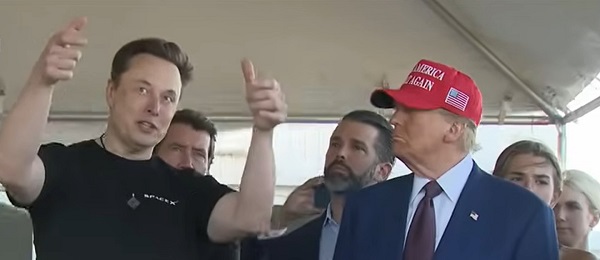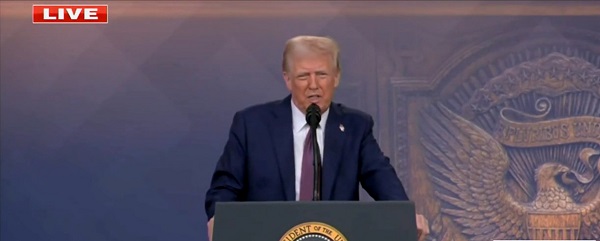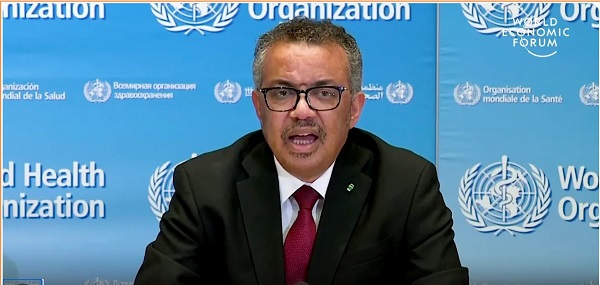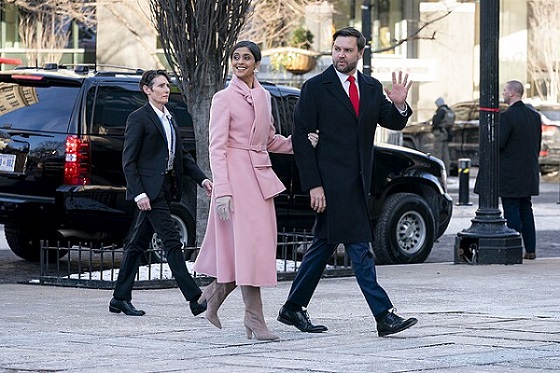Business
‘There Are No Sacred Cows’: Charles Payne Predicts DOGE Will Take Bite Out Of Military Industrial Complex


From the Daily Caller News Foundation
By Harold Hutchison
Fox Business host Charles Payne predicted Monday that the Department of Government Efficiency (DOGE) will likely cause a short-term hit to the stock market as companies that sell the Pentagon a “$500 hammer” will “take a hit.”
President-elect Donald Trump named Tesla CEO Elon Musk and former Republican presidential candidate Vivek Ramaswamy as co-chairs of the Department of Government Efficiency (DOGE) Nov. 12. Payne said that the committee had “no sacred cows” after discussing the committee’s plan to target federal spending and policies military and health care industries with former White House press secretary Kayleigh McEnany and “America’s Newsroom” co-hosts Bill Hemmer and Dana Perino.
“Here is the way I look at the next Trump 2.0. I look at Trump 2.0 as not necessarily, we’re gonna get everything in the next four years, but we’re gonna put things into place to create prosperity for America that I think could last at least three decades and the key part of this is, look where they’re going – there are no sacred cows,” Payne said. “Look at what they are going after.”
WATCH:
“On Friday, you had legislation to go after the pharmacy benefit managers, right? CVS stock is cratering. Eisenhower warned us about the industrial-military complex. Well, now we’ve got a health insurance industrial complex, we got a healthcare industrial complex, we got a military industrial complex now,” Payne continued. “There are hundreds of billions of dollars floating around and guess what? It’s not necessarily good news for the stock market initially. You know, because, some of these companies that get all of this money and charge us $500 for a hammer and $1,000 for a toilet seat, they may take a hit, but ultimately, it’s better for the country and that means it’s ultimately better for the stock market.”
Republican Sen. Joni Ernst of Iowa sent Musk and Ramaswamy a seven-page letter in November with suggestions ranging from addressing unused space in buildings owned or leased by the federal government to halting uncommitted spending for COVID relief, with the proposed cuts totaling over $2 trillion.
In April, Republican Rep. Michael Waltz of Florida confronted Secretary of the Air Force Frank Kendall about the Air Force paying $90,000 for a bag of bushings. The Pentagon also paid $14,000 for a 3D-printed toilet seat and $1,280 for cups, according to a release from Republican Sen. Charles Grassley of Iowa.
Ernst released a 60-page report on Dec. 5 that covered findings from Ernst’s investigations into telework since she sent an August 2023 letter to 24 government agencies seeking a review of the issues involved with telecommuting.
Trump reportedly is planning on privatizing the United States Postal Service, which lost $9.5 billion in fiscal year 2024, according to the Washington Post.
Business
Trump Reportedly Shuts Off Flow Of Taxpayer Dollars Into World Trade Organization


From the Daily Caller News Foundation
By Thomas English
The Trump administration has reportedly suspended financial contributions to the World Trade Organization (WTO) as of Thursday.
The decision comes as part of a broader shift by President Donald Trump to distance the U.S. from international institutions perceived to undermine American sovereignty or misallocate taxpayer dollars. U.S. funding for both 2024 and 2025 has been halted, amounting to roughly 11% of the WTO’s annual operating budget, with the organization’s total 2024 budget amounting to roughly $232 million, according to Reuters.
“Why is it that China, for decades, and with a population much bigger than ours, is paying a tiny fraction of [dollars] to The World Health Organization, The United Nations and, worst of all, The World Trade Organization, where they are considered a so-called ‘developing country’ and are therefore given massive advantages over The United States, and everyone else?” Trump wrote in May 2020.
The president has long criticized the WTO for what he sees as judicial overreach and systemic bias against the U.S. in trade disputes. Trump previously paralyzed the organization’s top appeals body in 2019 by blocking judicial appointments, rendering the WTO’s core dispute resolution mechanism largely inoperative.
But a major sticking point continues to be China’s continued classification as a “developing country” at the WTO — a designation that entitles Beijing to a host of special trade and financial privileges. Despite being the world’s second-largest economy, China receives extended compliance timelines, reduced dues and billions in World Bank loans usually reserved for poorer nations.
The Wilson Center, an international affairs-oriented think tank, previously slammed the status as an outdated loophole benefitting an economic superpower at the expense of developed democracies. The Trump administration echoed this criticism behind closed doors during WTO budget meetings in early March, according to Reuters.
The U.S. is reportedly not withdrawing from the WTO outright, but the funding freeze is likely to trigger diplomatic and economic groaning. WTO rules allow for punitive measures against non-paying member states, though the body’s weakened legal apparatus may limit enforcement capacity.
Trump has already withdrawn from the World Health Organization, slashed funds to the United Nations and signaled a potential exit from other global bodies he deems “unfair” to U.S. interests.
Alberta
Albertans have contributed $53.6 billion to the retirement of Canadians in other provinces

From the Fraser Institute
By Tegan Hill and Nathaniel Li
Albertans contributed $53.6 billion more to CPP then retirees in Alberta received from it from 1981 to 2022
Albertans’ net contribution to the Canada Pension Plan —meaning the amount Albertans paid into the program over and above what retirees in Alberta
received in CPP payments—was more than six times as much as any other province at $53.6 billion from 1981 to 2022, finds a new report published today by the Fraser Institute, an independent, non-partisan Canadian public policy think-tank.
“Albertan workers have been helping to fund the retirement of Canadians from coast to coast for decades, and Canadians ought to know that without Alberta, the Canada Pension Plan would look much different,” said Tegan Hill, director of Alberta policy at the Fraser Institute and co-author of Understanding Alberta’s Role in National Programs, Including the Canada Pension Plan.
From 1981 to 2022, Alberta workers contributed 14.4 per cent (on average) of the total CPP premiums paid—Canada’s compulsory, government- operated retirement pension plan—while retirees in the province received only 10.0 per cent of the payments. Alberta’s net contribution over that period was $53.6 billion.
Crucially, only residents in two provinces—Alberta and British Columbia—paid more into the CPP than retirees in those provinces received in benefits, and Alberta’s contribution was six times greater than BC’s.
The reason Albertans have paid such an outsized contribution to federal and national programs, including the CPP, in recent years is because of the province’s relatively high rates of employment, higher average incomes, and younger population.
As such, if Alberta withdrew from the CPP, Alberta workers could expect to receive the same retirement benefits but at a lower cost (i.e. lower payroll tax) than other Canadians, while the payroll tax would likely have to increase for the rest of the country (excluding Quebec) to maintain the same benefits.
“Given current demographic projections, immigration patterns, and Alberta’s long history of leading the provinces in economic growth, Albertan workers will likely continue to pay more into it than Albertan retirees get back from it,” Hill said.
Understanding Alberta’s Role in National Programs, Including the Canada Pension Plan
- Understanding Alberta’s role in national income transfers and other important programs is crucial to informing the broader debate around Alberta’s possible withdrawal from the Canada Pension Plan (CPP).
- Due to Alberta’s relatively high rates of employment, higher average incomes, and younger population, Albertans contribute significantly more to federal revenues than they receive back in federal spending.
- From 1981 to 2022, Alberta workers contributed 14.4 percent (on average) of the total CPP premiums paid while retirees in the province received only 10.0 percent of the payments. Albertans net contribution was $53.6 billion over the period—approximately six times greater than British Columbia’s net contribution (the only other net contributor).
- Given current demographic projections, immigration patterns, and Alberta’s long history of leading the provinces in economic growth and income levels, Alberta’s central role in funding national programs is unlikely to change in the foreseeable future.
- Due to Albertans’ disproportionate net contribution to the CPP, the current base CPP contribution rate would likely have to increase to remain sustainable if Alberta withdrew from the plan. Similarly, Alberta’s stand-alone rate would be lower than the current CPP rate.
Tegan Hill
Director, Alberta Policy, Fraser Institute
-

 2025 Federal Election1 day ago
2025 Federal Election1 day agoPoilievre refuses to bash Trump via trick question, says it’s possible to work with him and be ‘firm’
-

 Dr. Robert Malone2 days ago
Dr. Robert Malone2 days agoWHO and G20 Exaggerate the Risk and Economic Impact of Outbreaks
-

 2025 Federal Election2 days ago
2025 Federal Election2 days agoVoters should remember Canada has other problems beyond Trump’s tariffs
-

 2025 Federal Election1 day ago
2025 Federal Election1 day agoPoilievre to let working seniors keep more of their money
-

 COVID-191 day ago
COVID-191 day ago17-year-old died after taking COVID shot, but Ontario judge denies his family’s liability claim
-

 Daily Caller1 day ago
Daily Caller1 day agoCover up of a Department of Energy Study Might Be The Biggest Stain On Biden Admin’s Legacy
-

 Community1 day ago
Community1 day agoSupport local healthcare while winning amazing prizes!
-

 International1 day ago
International1 day agoVice President Vance, Second Lady to visit Greenland on Friday







